|
All foot health services
Biomechanics Barnet, Biomechanics in Barnet, Barnet Biomechanics. Biomechanics Barnet, Biomechanics in Barnet, Barnet Biomechanics.
|
Member of:-


|
|
|
KEYPHRASE
Keyphrase BARNET
|
|
|
|
Biomechanics Barnet
Chances are, you are not alone.
|
The average person takes thousands of steps every day, which results in extremely high pressures placed on the feet. With every step you take your foot hits the ground with a
force equal twice your body weight (and up to eight times your body weight during
sporting activities).
If the foot and leg are not correctly aligned it can lead to biomechanical problems with
lasting effects.
|
At the Beehive & Brookland Foot Clinics we aim not only to give temporary relief to your foot problem, such as removing the corn or callus, but whenever possible find a permanent cure. This can only be achieved by examining the foot in detail and looking at how the foot may be failing to function correctly.
A biomechanical examination includes examining the feet in both a weight-bearing and non-weightbearing situation. Angles and data of the feet and legs are taken and used to determine what is wrong and which treatment would be most beneficial. The feet and legs are also examined whilst walking using Computerised Gait Analysis (CGA).
Computerised Gait Analysis
A computerised Gait Analysis (CGA) allows us to see what is happening to your foot whilst standing and walking. Areas being overloaded or at risk are instantly identified and your treatment can be planned accordingly.
|
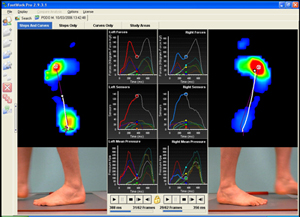
|
|
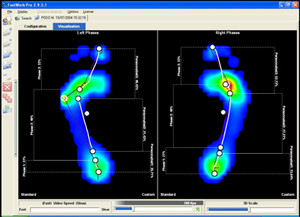
|
If a patients' feet are misaligned, i.e. out of line with the legs, problems may occur not only in the feet but also in the lower limb and back.
In a 'perfect' foot, the heel and leg are at right angles to the ground whilst the ball of the foot is flat against the ground. However, often the back of the foot is unstable resulting in the heel rocking inwards bringing the arch of the foot closer to the ground, a condition known as over-pronation. Note also how the forefoot move outwards – perhaps explaining that corn that develops on the small toe.
|
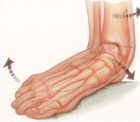
|
|
As a result of this imbalance, symptoms might include :- heel pain, arch fatigue, plantar fasciitis, corns and calluses, bunions and toe deformity, leg and ankle imbalance and lower back pain.
|
So what can be done to correct an imbalance of the feet ?
Often a plaster cast of the foot is taken to capture it's misalignment and from this a prescription insole is made, an ORTHOTIC, which when worn in the shoe offers stability and pain and pain relief. It is important that Orthotics should be designed with the appropriate prescription to control this condition
|
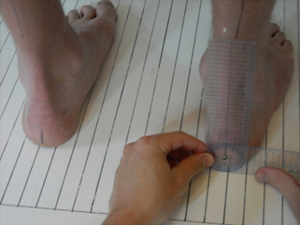
A bio-mechanical examination determines the prescription of the orthotic
|
|
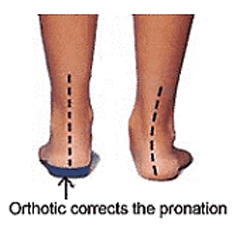
Orthotic corrects the excessive pronaton
|
|
|
|







